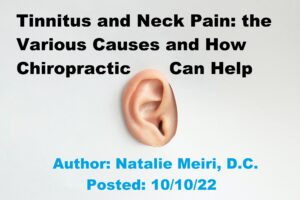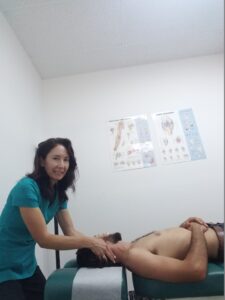
Tinnitus is relatively common. Mostly, you will complain of “ringing” in the ears. However, there are numerous sounds besides “ringing” that are considered tinnitus. Furthermore, there are many causes as to why it happens: vascular, ototoxicity (drug induced), cochlear (inner ear), small muscle spasms (close proximity to the ear), temporomandibular (jaw) joint or cervicogenic (neck).
Causes
Firstly, tinnitus is a symptom and not a disease. It could be in one or both ears. It is a symptom of a disease or dysfunction in your ear, the auditory (sense of hearing) nerve connecting your inner ear to your brain and/or the parts of your brain that process sound. And tinnitus could simply be due to ear cerumen (wax) impaction, a side effect of medications or due to a more serious problem.
Secondly, tinnitus could be caused by hearing loss. An example is noise-induced hearing loss due to exposure to environmental noise such as machinery, loud music, or earphones. So along with the hearing loss, you may develop tinnitus from the damage induced to the inner ear. Moreover, tinnitus is sometimes the first sign of presbycusis (hearing loss in older people). Also, otosclerosis is a condition in which there’s abnormal bone growth inside the ear causing hearing loss. Otosclerosis happens in young people and causes hearing loss along with tinnitus.
Thirdly, otitis media (ear infections) may cause tinnitus. Similarly, repeated ear infections can cause scar tissue in the middle ear. This scarring can cause irritation of the nerve endings and cause tinnitus as well as hearing loss.
Fourthly, tinnitus can be due to an endocrine (e.g. hormonal) problem, vascular (e.g. heart/cardiac murmur) problem, or a tumor (e.g. acoustic tumor).
Fifthly, tinnitus could be due to trauma to the head, ear or neck (e.g. whiplash).

Tinnitus and Neck Pain: the Various Causes and How Chiropractic Can Help
First, the theory is joint dysfunction may produce reflex muscle spasm or alter input to the vestibular nuclei (nerve complex) in the hindbrain. The vestibular nuclei function in the maintenance of equilibrium and posture, the perception of head position and acceleration, as well as general muscle tone. Second, the chiropractic approach is to reduce muscle spasm and free restricted movement through manipulation/adjustments. Third, a connection to tinnitus may be the relationship of the trigeminal nerve (5th cranial nerve) to the ear and the upper cervical (neck) spinal segments. Research supports a positive effect with cervical adjusting alone or in combination with vertigo exercises to correct this.
Tinnitus Due to Whiplash or Vertebrogenic (spinal) Vertigo
If the tinnitus is post-whiplash (acceleration/deceleration injury to the neck) or associated with other indicators of vertebrogenic (spinal) vertigo, chiropractic manipulative treatment may be helpful. Vertigo is the sensation that you, or the environment around you, is moving or spinning.
Frequently, there is an overlap between cervicogenic (spinal) vertigo and other peripheral (not central nervous system) vestibular vertigos such as Benign paroxysmal positional vertigo (BBPV) and Meniere’s disease. There is research reporting on chiropractic manipulative treatment as an effective alternative treatment for patients with tinnitus. For Meniere’s disease, Chiropractors help treat the symptoms of vertigo and tinnitus naturally.
Meiri Chiropractic serving West Palm Beach, Jupiter, Palm Beach Gardens and North Palm Beach offers excellent chiropractic treatment for Tinnitus. Call us in West Palm Beach at 561-253-8984 to schedule an appointment or to find out more about Tinnitus and Neck Pain: the Various Causes and How Chiropractic Can Help.